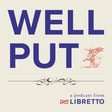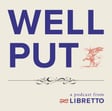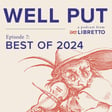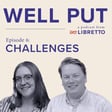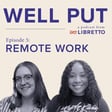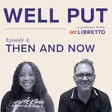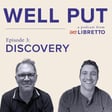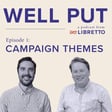Become a Creator today!Start creating today - Share your story with the world!
Start for free
00:00:00
00:00:01

Episode 12: Dartmouth Health (with guest Matthew Barone)
We're excited to welcome Matthew Barone to Well Put! Matthew is Executive Director, System Communications at Dartmouth Health, one of the largest healthcare systems in New England, and has been a longtime partner of Libretto. He spoke with Librettists Adrian Pio and Ian Sutherland about our work developing messaging for Dartmouth Health's network of hospitals, clinics, and specialty programs.
In this episode:
- Matthew Barone, Executive Director, System Communications
- Dartmouth Health System (website) (Libretto case study)
- Funny Because It's True by Christine Wenc
- Josh Johnson
Hosted by Adrian Pio and Ian Sutherland
Produced and Edited by Tiffany Carlson
Music by Coma-Media, via Pixabay
© 2025 Libretto. All Rights Reserved.
Recommended
Transcript
Podcast Introduction and Guest Appearance
00:00:13
Speaker
Welcome to Well Put, a podcast about communications for mission-driven organizations from Libretto. My name is Ian Sutherland. I'm a senior creative lead here at Libretto.
00:00:24
Speaker
And I'm Adrian Pio, also senior creative lead at Libretto. Today, we're excited to have a special guest on the podcast to talk a little bit bit about his work in communications and about his relationship with Libretto.
00:00:37
Speaker
um His name is Matthew Barone. He's the executive director, system communications for Dartmouth Health. Matthew, you tell our listeners a little bit about yourself.
Matthew's Role and Philosophy
00:00:46
Speaker
Hi, thanks so much, Ian and Adrian. It's great to be here with you.
00:00:51
Speaker
um So I'm a communications professional. I ah pride myself on not wanting to be in front of the camera. So it's good that you were able to arm twist me into this conversation here. um and I'm joking a little bit, but um i I see myself or I've described myself as somebody who elevates organizations, makes them present in the public realm, elevates leaders, CEOs, um to make sure that their vision for an organization is seen, heard, appreciated, valued.
00:01:24
Speaker
and And I spend very little time talking about myself, but I have enjoyed my career. I've had a really great run. It's ah nice reflecting on our time together with libretto um and just how many years have gone by. But i'm I'm thrilled to be here and to talk a little bit more about our profession.
Collaboration with Libretto
00:01:46
Speaker
On the topic of a long, fruitful relationship, Matthew, you've worked with the libretto team in some capacity ah for a while now on a couple of different projects. Could you tell us about how that relationship started and how it got to the point where it's at now?
00:02:03
Speaker
Yeah, I think it goes back to maybe it's 2011, 2010-ish. And I was working at Bancroft School, a day school or a private day school, I should say, in Worcester, Massachusetts.
00:02:21
Speaker
And we were embarking upon um sort of a rebrand. you know I think it was more than just ah a view book request. I think it was um We need to discover and identify through clarity um and describe who we are to our employees, describe who we are to our external audiences.
00:02:42
Speaker
And they needed some pros. And so we went through a pretty elaborate review process and part and ended up identifying a Boston design firm that that often worked with libretto. And was a real education for me because this was the first time I partnered with a really large agency.
00:03:03
Speaker
Well, and not even that large, but, you know, an agency of any kind who also pulled in expertise where needed. And because we identified a need for messaging and multiple audiences, libretto was pulled in. And I think From the beginning, i was just really interested in working and collaborating and, you know, going in to the big city, but Boston, and kind of like rolling up your sleeves and working with professionals, like-minded professionals, because...
00:03:34
Speaker
in a lot of communications offices where I was starting out earlier in my career, you're one-stop shop. You might be doing volunteer services one day. You might be doing um fundraising the next and taking name tags. You know, there's, there's incredible humility in starting out your career. And I try my best to never forget those moments. And so, so that, I think that it goes back to then when we first met and started working together and,
00:04:03
Speaker
ah Since then, I believe we've touched at every spot I've traveled to pulled and I've consistently pulled you in because I've so quickly learned the importance of ah of really working from ah strong foundation of who we are as an organization before just jumping in and coming up with a communication plan and executing it with new ah employers that I've been working with throughout.
00:04:29
Speaker
my career. So since then, you have been at every spot I've been I think, Matthew, that you actually predate my own tenure at Libretto based on that timeline, which is it's a wonderful thing to think about. And I think part of the reason why we were so excited to have you on to talk a little bit about your experience is because you are one of our great implementers. I think of you as somebody who's really done a wonderful job of taking the words, taking the messaging language, and putting it into practice in a really meaningful way. And I imagine that's a ah big part of why we've been able to work together
00:05:01
Speaker
um So many different contexts. i mean I think the current, you know our most recent engagement together, the project that we're working on with you at Dartmouth Health is a really good example. It's probably certainly the largest that I've worked on, but I think it's probably one of the largest engagements as far as the number of stakeholders, the number of interviews, the number of messaging touch points that Libretto has engaged on it.
Dartmouth Health Messaging Project
00:05:22
Speaker
Ian and I did an accounting at one point. I think we've we've interviewed or had conversations with more than 300 folks across the health system. We worked on a number of different messaging platforms that are part of that suite that all go towards telling the story for Dartmouth Health. I wonder if you could talk a little bit about, you know just from your perspective, um the way that messaging is supporting the communication goals of the health system and how this type of a project is allowing you to approach your different audiences from a strategic point of view Yeah, that's ah that's a great question. um and it is remarkable how far we've come from such a such a clearly identified, i would say, small ah group of stakeholders to the enormity of Dartmouth Health, the largest employer of New Hampshire. I mean, it's it's quite a...
00:06:09
Speaker
staggering um thing to think about there uh and I I would say that it it has um it has really it has really been an important component to our clarity of message we are first and foremost um a health system that's caring for the people of the state of Vermont and New Hampshire many many people And what makes ah health system so strong are the members or the various medical centers throughout each state that serve those communities. Some of them have been in place embedded within those um those locations for over sometimes years.
00:06:55
Speaker
these are long standing organizations that have history, that have um lots of ah commitment to care over decades and decades.
00:07:06
Speaker
um I bring that up because it is a much more complicated environment to provide clarity of messaging and communications when you have not only history within an organization over many decades, but you also have just a patchwork of community hospitals throughout regions that sometimes aren't always as obviously connected as they might be.
00:07:30
Speaker
So Dartmouth Health is trying to unify. i our mission is to really unify the messaging to have clarity. within the system communications to patients and to the community and also to employees as well. But beyond that, we also spend a lot of time, and I know that you and i talk about this at every meeting or every um discovery session that we might have with various constituents, the critical nature of the identity of the organization. And so while we have what we call
00:08:06
Speaker
Internally, you know these pillars of excellence and focus for the health system, um i am I am really focused on the importance of never forgetting the identities of each organization that makes up that um mission of Dartmouth Health itself, because without those locations, those medical centers caring for local communities, then we don't exist, right? And so they are just as critical um to the mission of Dartmouth Health as the system is to those members. So it's very much an interdependent relationship.
00:08:47
Speaker
I think a key part of that ah capturing of a a community voice and an identity across such a ah a broad swath of stakeholders, Matthew, is working and listening to folks from across all of these organizations, not necessarily from the top down, but speaking to folks in facilities, speaking to folks um who are providers, speaking to folks in the C-suite, et cetera.
00:09:13
Speaker
And that's also, i i imagine, a key part of your role is making sure that when you're speaking to all of these different internal audiences, as well as those external audiences you mentioned, um you have that cohesive voice to sort of depend upon.
00:09:26
Speaker
So just kind of curious in ah in a day to day setting, um are you, you find yourself borrowing from some of these messaging platforms, maybe to build a PowerPoint that you're giving to um folks in the C-suite or do you pull from it to prepare remarks?
00:09:45
Speaker
what What's sort of your day to day kind of dependence on the messaging? Yeah, so i I use it frequently and I'm often the person saying when I'm looking to approve a document, a presentation, a video, you name the channel, I'm always asking the question, have we utilized...
00:10:06
Speaker
the messaging platform. We provide tools to departments, and I call them ambassadors of the organization. we want i always want them to make sure that they're using those tools. And the language of care that we call this, or the messaging platform, is really one tool in the toolbox, but it is invaluable. and i I often, um and I love the training programs that we do as well, and we'll probably get to that a little bit later, but i I often use the analogy of a springboard, that the messaging that we develop together, and by together, I do mean together as in the royal we, i mean, given all of the interviews that we've done during the discovery phase, it's hard to imagine somebody hasn't had the opportunity to weigh in, and what we discover are themes, and
00:10:57
Speaker
And those things end up going into the platform itself. But when i when I describe the importance of the document and how to use the document internally to staff and colleagues, um I'm always saying really the the words that you see here, the phrases that you see here are meant to be a springboard to your own personal experience and your personal story.
00:11:22
Speaker
That's what makes it authentic. That's what makes it credible for when you're writing a script, when you're presenting to an audience in the community, um when you're posting some language to ah social media caption on behalf of the organization.
00:11:39
Speaker
The springboard experience is taking the words on the paper the story that you've experienced as a member of this organization and putting it out and, and, and sharing that to whatever audience is your target. And that makes it credible.
00:11:57
Speaker
I love that analogy. and We're going to have to add that to our our bank of messaging metaphors. Sometimes we talk about messaging as a playbook. You can call the play in the huddle, but then when you get out there, you have to read the defense.
00:12:08
Speaker
And then people in the audience inevitably raise their hand and say, well, I don't i don't know anything about football. What are you talking about? Certainly. ah I think a springboard maybe works at for a different group of folks. You mentioned the training quick, and I do want to talk about that because I think you know when we talk about messaging, there's certainly the products that we produce at the end, but we also think very much about it as a process.
00:12:30
Speaker
um process of engagement, a process of sort of coming into alignment as an organization, um making sure that everybody within um who's engaged along the way feels really involved and really proud of the product and also feels like they can see their springboard within it. you know They can understand the ways that they tap into it.
00:12:47
Speaker
um And that's really where the role of the messaging comes. I'm sorry, the message training comes in. And that tends to be one of the, I think, at least from our perspective, one of the more enjoyable sessions when you can see folks' eyes light up and they say, oh yes, that that thing that they've been hounding us about for months, like it actually makes sense and it looks right and it sounds like me and I'm proud to work in an organization that that thinks of itself this way.
00:13:09
Speaker
um And I know you've been engaged in, gosh, probably dozens of trainings at this point with us. And thank you for coming along for the ride. But I wonder if you could reflect from your perspective what it's like to see um folks sort of start to grasp it and and how that works as part of getting people on board.
00:13:26
Speaker
Absolutely. i compare it to making a huge feast your family during a holiday, spending hours and hours preparing it, coming up with the plans of what we're going to eat, who likes what, who doesn't like what what, what is the whole family like together, and then putting it out on the table and watching everyone just smile, say thank you, and really appreciate all of the variety and diversity of what's on that table.
00:13:56
Speaker
What we do together in creating these messaging platforms comes to fruition and the reality, right? um When it's shared for the first time in a training and you're able to see the faces light up and nod. And i it happens every single time we have a training experience, or at least in my the career that I've had here with all of you is that the the folks that have participated in this process from beginning at discovery to the end when it comes to the final draft in the implementation at a training it's this aha moment where you actually get it like I I see it on paper we're talking about it as a group we're um
00:14:43
Speaker
seeing what we contributed. And to your point, Adrian, you know, you acknowledged it ah a few minutes ago, just like, I see, I see my word, I see my conversation with you months and months ago in this message. It doesn't mean it's word for but I know it's from me.
00:15:01
Speaker
Right. And the more people around the room almost always say, you know, this really resonates with me. I have yet to see someone dissatisfied with this experience, which is um to me, it shows the value and and the training component um is where you get down to real emotional experience. Right. Like when we ask them about connect this sentence, this phrase, or this, you know, positioning ah statement, connect something within that, those words to your own work experience, to your own ah professional experience within Dartmouth Health, for example, or whatever organization it is, they always come up with something.
00:15:46
Speaker
And it's all, it's almost always something really personal, and really emotionally tied in some cases, depending on the subject matter, but it can be made inspirational. It's, I find that, yeah, it's wildly exciting. People get, you know, tear up listening to their colleagues. that Yeah.
00:16:04
Speaker
Yeah, and absolutely. and and, and I've said this many times, but you know, the largest, and I don't recommend this for anyone listening, but but the largest um training I gave was to around 125 leaders um at one of our members within Dartmouth Health and it was um ah it was a a group that didn't fully participate not every single person participated but a good percentage of them had participated in in the experience And we went into the exercise phase and we had a readout and I had budgeted for, you know, a reasonable amount of time for the readout and and the story sharing.
00:16:45
Speaker
But we quickly ran over and let it run over. Like we we all said, we're abandoning the agenda. but justs kind of We're just going to focus on this because it was a it was such a passionate moment, right?
00:16:57
Speaker
We had nurses, professionals. connecting to the words of clinical care, connecting to the words of what being a good neighbor in the community means. And you know I couldn't help but not only be captivated by the stories, but also want to write them down. As a communications professional, I always say to my team,
00:17:18
Speaker
You have to have your ears open and have a notebook open and ready for these stories, because what comes out of these personal experiences, you just can't get when you set up a meeting like you get it from a real authentic um training experience like this when they're sharing their stories and their connection to the words on the paper.
00:17:38
Speaker
And there's something very powerful about people seeing themselves reflected in their organization's communication
Importance of Internal Communication
00:17:46
Speaker
strategy. And that's that's where that cohesion comes from. And that's why folks are, as Adrian was saying, inspired and proud to work where they work.
00:17:53
Speaker
um I'm curious, Matthew, as a communications professional, what are some of the challenges you're seeing in the industry right now? And do you have any advice for other folks in the sector?
00:18:06
Speaker
so So right now, today, i would say one of the biggest challenges we face is disruption. and i don't think that that is um exclusive to just the healthcare industry i think virtually every industry right now is faced with enormous disruption under varying degrees at different points of a week or a month or the or the year and
00:18:38
Speaker
that can be taxing on your employees you know we have uh really struggled with making sure that our staff are aware of the resources available to them given the disruption that they're facing uncertainty with funding and research uncertainty with um insurance coverage you name it people are on edge and I think anxious right now and and it's our job to provide them with accurate information to remain supportive um to be there when they need us and I would say from like a really high level
00:19:17
Speaker
clarity in our messaging, um consistency in our messaging, and the third one would be repetition, right? I can't be satisfied in getting the message out that's clear and consistent with one one take.
00:19:34
Speaker
It's got to be a really integrated strategic approach. In other words, a great example would be, I send off an email and I expect all 14,000 employees in our health system to have read it.
00:19:46
Speaker
probably not going to happen right and i realize that right all the time that i go in worrying about the verb worry about the ah word choice um at the end of the day it just needs to be clear consistent uh and we need to repeat it so maybe that means we arm leaders with talking points on a subject matter whatever it is uh in addition to the email maybe we utilize digital monitors throughout the um break rooms to make sure that that message is repeated a third time, not just from the email, not just from the leader, but also on signage that they might be seeing at the beginning beginning or end of their day.
00:20:25
Speaker
um So I really think the repetition, given the noise that we're all experiencing here right now, is just more critical than ever.
00:20:37
Speaker
I love that. i I really love that you focus first on the internal audience and communicating within the organization. I think often you hear communications, people think external or PR or advertising.
00:20:49
Speaker
So much of the role of communications is about getting the message out internally, making folks feel like they're involved internally and engaged and and represented authentically within the organization. I think that's great. um Also, as long as I've been at Libretto kind of going on 13 now, I'm thirteen years now um When I first joined, the joke was nobody reads anymore.
00:21:09
Speaker
And certainly they're not reading more now than they were then. So it is ah is an unfortunate trend. But I think you're right that just really hammering home, finding what that the key idea, the key few words are or points that you want to get across are, and then really hitting them and not worrying that You know, we I said this in my last message and I said this in the message before because not everybody's reading every message. And if they are, they understand why you're saying it more than once.
00:21:36
Speaker
Yeah. And I would also say, too, you that while they might be reading less, they're still consuming information. And if we decide at the end of the day, you know, maybe the email isn't the best approach, but for whatever reason, a video message from our leader is or a CEO or whatever.
00:21:53
Speaker
whomever, you know, someone has to write the script. Somebody has to write the talking points, the generalized talking points. We're still always going to need to have thoughtful communications being drafted and proposed. So I do agree that, right, the form is changing and it will continue to evolve over time.
00:22:15
Speaker
um But there's still going to be that core content need regardless. That's excellent.
00:22:33
Speaker
Matthew, I want to thank you on behalf of myself and Ian and the Libretto team, not just for joining us today, but for your long partnership. This has been a lovely conversation. I hope some of the folks at home have learned
Reflections and Closing Thoughts
00:22:44
Speaker
a bit. We're excited to and also invite you to join us on our ending segment where we get to reflect away from the disruption and on some of the positivity, some of the things that we've been loving lately.
00:22:55
Speaker
And so maybe I'll turn to Ian first and then to you just to give you a minute to think on it. But Ian, if you wouldn't mind kicking us off, what are you loving at the moment?
00:23:06
Speaker
Thanks, Adrian. I'm going to tell you in a moment, I also, I wanted to say a quick thank you to Matthew as well and reflect on ah not only a long history of the relationship between Matthew and Libretto's work and the work we've done at ah several several of the organizations that Matthew's been involved with, but in a very small world kind of way, Matthew and I also lived at the same building at different times in our lives in Boston, 1687 Commonwealth avenue something I always find to be extremely funny and extremely coincidental.
00:23:41
Speaker
So it was meant to be, Matthew. was meant to be. yes Yes. As the great Stephen Wright once said, it's a small world, but I wouldn't want to paint it. Yeah. You have such a good memory and we're not even the same generation. So I think i think that's pretty remarkable.
00:23:55
Speaker
Everyone starts out in that area of Boston out of college, typically. So they do. is It was a great neighborhood to I think to start start my career. I was I started at libretto right after school.
00:24:07
Speaker
And yeah, many fond memories of Austin. But to answer ah your question, Adrian, for this segment, I just read Funny Because It's True, which is a history of the satirical newspaper, The Onion, and I can't recommend it enough, especially for folks who work in communications because a lot of the...
00:24:29
Speaker
sort of overall subtext is about how this very funny newspaper has in fact influenced a lot of the media cycle and has responded to a lot of the media cycle and in very interesting ways.
00:24:43
Speaker
And um not only is it a hilarious story, but I think also very prescient of the time that we're in now. I wanted to read it because Libretto just had an offsite in Madison, Wisconsin.
00:24:54
Speaker
As it happened, The Onion was founded by University of Wisconsin-Madison. undergraduates in the late 80s. And yeah, it's so it's a fascinating story. i have i guess what I would say is I've taken the onion for granted. I discovered it in early high school.
00:25:11
Speaker
I thought it was the funniest thing i'd ever read. But i had no i had no idea the history behind it, that there were you know that there were these people that went to work every day to come up with these headlines and these ridiculous stories, in some cases that are commenting on you know ridiculous happenings around us.
00:25:30
Speaker
So yeah, that would be that would be my recommendation to you all if you have few of time. it's a great It's a great read before bed, a lot of very funny and a lot of good jokes and and really interesting history too.
00:25:43
Speaker
you familiar with the concept of eating the onion, Ian? No, no. It's when I think that there might be like a subreddit community about it or something, but it's when people um unironically post Onion articles because they think it's a real headline.
00:25:59
Speaker
And that's it happens a lot. yeah That's too funny. Matthew, ill I'll toss it over to you, though. What are what are you loving? So I don't have a book, but I am loving this time of year, fall and the approach of winter. And happiest, honestly, when I cook.
00:26:24
Speaker
I have an addiction to cookbooks all kinds of cookbooks. I've had to have shelving installed for the expansion of the department. Um, at home and i love nothing more than having friends over or neighbors and getting to know them a little bit better or, you know, just the concept of breaking bread and doesn't have to be, you know, pretentious or anything, but, um,
00:26:53
Speaker
i I just, I really enjoy cracking open a new cookbook and trying something new. I almost never cook a meal more than once. And if a holiday comes by and it's a traditional, I don't know, turkey, for example, that's coming out, that's not my thing. So I will wash dishes on those days. I'll clean the house to get ready for a holiday.
00:27:15
Speaker
I'll um But I will be at the stow or the barbecue or doing something if it's, you know, a new neighbor moves in or we have friends that we want to have over and just get to know, get to know people. So that's what makes me happy.
00:27:30
Speaker
I love that. oh Yeah, what a time. It's a perfect time of year for getting together as well. I know we do have Thanksgiving on the horizon. Yeah. Sounds like you won't be making the turkey. Maybe you'll make another make an interesting side dish. I might do a side dish that no one's ever had before. but I love that.
00:27:46
Speaker
Anyway, thank you. Excellent. um My contribution this week, it's something I've been loving for most of this year, but I don't think we've talked about it on the podcast before, is this comedian Josh Johnson.
00:27:58
Speaker
um I discovered him, gosh, maybe about exactly a year ago leading up to when when the Kendrick Lamar was announced as a Super Bowl halftime performer. And there was the controversy with Kendrick and Drake.
00:28:10
Speaker
Josh Johnson is a standup comic. He did this great 30 minute bit that I found on YouTube that was you know Kendrick and Drake explained for white people. um And it just killed me. And i I sort of learned a little bit more about him. He came up through The Daily Show. He was a writer for them for many years. He did some segments.
00:28:27
Speaker
He's hosted actually a couple of times this year as well. um But what's most remarkable about him is that he's been on this tour, standup tour, you know going to various cities around the US. um And every week he will do a full set, like an hour. you know i'm sure he does it a couple times a night, so he gets a little bit of workshop.
00:28:44
Speaker
But it's a new set every week. He does an entirely new hour of comedy. um It's almost always topical. It's often political. It's very much in the vein of like a Mike Birbiglia or Marc Maron, where he's sort of telling stories with a little bit of a critique, a little bit of a bite at the end.
00:29:00
Speaker
But it's really, I've just been blown away to see somebody who's essentially writing a full stand-up show once a week and doing a great job. um I highly recommend that you check him out if you've got any interest. Even my mom came across him and then, course, sent me a video. or I had recommended him to her, and she found him and then independently sent me a video of him talking about this year's Super Bowl halftime show. So, you know, what's old is new.
00:29:24
Speaker
talking about the controversy around Bad Bunny. it's a It's very funny. Highly recommend. That's amazing me to do a full hour. at The amount of time and commitment that takes is, that's unbelievable.
00:29:38
Speaker
You had mentioned me too, him last year. Yeah, I'll check him out, Adrian. Matthew, thank you again for joining us. It's been great to catch up and to just talk about ah not only this great collaboration we've had at Dartmouth Health, but our working relationship over the years.
00:29:54
Speaker
and This has been Well Put, a Libretto podcast, and I'm Ian Sutherland. And I'm Adrian Pio. If you want to learn more about Libretto and what we do, you can check out libretto-inc.com.
00:30:09
Speaker
Well put.
